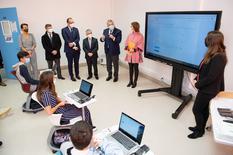- Homepage
- A la Une du Portail
- 1,200 Laptops Have been Distributed to Pupils in the Principality - The Digital Secondary School - A New Phase in the Future of National Educati
1,200 Laptops Have been Distributed to Pupils in the Principality - The Digital Secondary School - A New Phase in the Future of National Educati
Today, the Principality of Monaco reached a new milestone in the digital transition of schools. Following the obligatory programming courses that were introduced in nursery schools last year and the launch of EduLab Monaco - a centre of excellence and innovation for training teachers in digital education - Monaco has made the "digital secondary school" a reality.
Minister of State Pierre Dartout was personally involved in distributing 1,200 or so laptops to all secondary school pupils in the Principality, along with all the textbooks and software, chosen by teachers. Accompanied by Patrice Cellario, Minister of Interior, Frédéric Genta, Country Chief Digital Officer, and Isabelle Bonnal, Director of Education, Youth and Sport, he was able to experience a secondary school class in the digital age.
"With its equipment, software and new practices, which it makes widely available, the Digital Secondary School meets three challenges, explained the Minister of State. He then detailed these challenges: "An educational challenge, with a view to encouraging teachers' pedagogical creativity and better learning for pupils; an economic challenge, related to COVID-19, to facilitate educational continuity outside the classroom; and finally, a generational challenge, training the talent of tomorrow to meet the country's needs and offering the best opportunities to our young people, who must master these tools and know how to use them responsibly."
For his part, Patrice Cellario emphasised the fact that "parents, teachers and pupils have been involved in this approach since the beginning of the project, so that their needs could be fully taken into account. To familiarise themselves with this equipment and increase skills over the long term, tailor-made support has been put in place."
Frédéric Genta, in turn, gave a concrete illustration of the uses of this digital secondary school: "For pupils, this digital learning method will enrich the approach to a wide variety of subjects: modern languages, by dubbing a film, for example; finding out about history via online quizzes; learning French through collaborative writing and audiovisual illustration or geography by browsing 3D sites. However, this added value will also be expressed in the acquisition of 21st century digital skills and the implementation of educational continuity in and out of the classroom, with the added bonus of lighter school bags, as the textbooks are digitised! Finally, it will make it possible for teachers to offer more varied learning resources, strengthen their teaching methods and make it easier to innovate in their teaching."
Finally, Isabelle Bonnal stressed the importance of pedagogy, which is central to digital transition in education: "By providing equipment to secondary school pupils, we are entering an era of enhanced education, in a practical way. It will be possible to capitalise on our strengths while developing new ways of learning. This transition is certainly digital, but it is also learner-centred."
The next step in the digital transition of education in the Principality will be the introduction of the Digital High School, scheduled for 2021.
Autres actualités du thème

Le Nouveau Musée National de Monaco présente l’exposition « CACTUS » - 6 juillet 2025 – 11 janvier 2026 - Villa Sauber, 17 avenue Princesse Grace

Baccalauréat 2025 : d’excellents résultats pour l’édition 2025 des examens de fin d’année

Jumping International de Monte-Carlo 2025 : quels aménagements routiers ?







